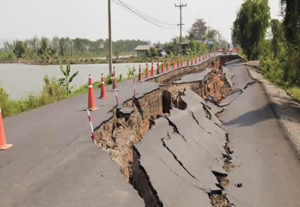Ghana needs resistant structures to enhance preparedness for future occurrence of earthquakes
 Mr Isaac Kuuwan Mwimbelle, Acting Director General of the Ghana Geological Survey Authority (GGSA), has advised government to encourage the building of earthquake resistant structures to enhance Ghana’s preparedness for any future earthquake.
Mr Isaac Kuuwan Mwimbelle, Acting Director General of the Ghana Geological Survey Authority (GGSA), has advised government to encourage the building of earthquake resistant structures to enhance Ghana’s preparedness for any future earthquake.
“Earthquakes will definitely happen one day, as such, we need to rely on technology and look at how we can engineer a lot of our buildings to withstand such occurrences.”
“Over the years, building engineering has developed and even in areas where construction won’t be suitable, buildings can still be properly engineered to withstand earthquakes,” he said.
In an interview with the Ghana News Agency on Friday, the Ag Director General bemoaned the increasing development of structures along high-risk earthquake areas and urged City Authorities to halt such activities.
He also advised the public to desist from putting up structures in such high-risk areas for their own safety.
Mr Mwimbelle said the GGSA was putting together a sensitisation programme for occupants of high rising buildings, the public and institutions, on preparedness and response measures towards earthquakes.
He advised them to seek expert advice from the GGSA before putting up structures in any area, adding that, such a step would ensure that people did not build in high-risk zones.
The Ag Director said in the advent of an earth tremor or earthquake, it was advisable to hide under a bed or wooden table for protection against any falling object or the collapsing building.
“After the event, find open spaces and congregate there so that in case there are any structural failures, you will not be impacted by them. If you are also on a bridge, it is advisable to immediately get off the bridge so that if it falls, you will not be affected.”
“Also make sure you’re at a safe place where falling objects would not hurt you and only return to your place after relevant authorities have advised you on what to do,” he added.
Professor Mrs Paulina Amponsah of the School of Nuclear and Allied Sciences, Ghana Atomic Energy Commission, also told GNA that the recent earthquakes in Turkey and Syria should serve as a wakeup call to Ghana.
She said even though it was over 80 years since Ghana experienced an earthquake, the earth tremors experienced in recent times meant that energy was building up within the earth which could cause a major earthquake anytime in the future.
She said unlike Turkey, Ghana was very far from major earthquake zones and even in West Africa, the nation was in a stable zone.
She advised citizens to learn from Turkey and Syria’s cases and adhere to the right building codes.
“Policymakers and City Authorities are doing their best to enforce building regulations, but some citizens are hampering their progress by always finding ways to avoid them. Ghanaians should see what is happening elsewhere and mend their ways,” she said.
The Professor urged the Government to pay attention to seismic technology by putting aside budget for research in that field.
Mr George Ayisi, Director of Communications, National Disaster Management Organisation (NADMO), said the Institution was well positioned to provide relief services should any earthquake hit Ghana.
He said the various earth tremors recorded over these few years had prompted NADMO to take precautionary measures ahead of any earthquake occurrence.
Mr Ayisi said NADMO, together with the Ghana Ambulance Services, Ghana National Fiire Service, 48 Engineers Regiment of the Ghana Armed Forces, Ghana Police, Ghana Water Company Limited, the Electricity Company of Ghana, Volta River Authority, Geological Survey and other sister agencies, had embarked on about four full scale simulation exercises to boost response to earthquakes.
Source: GNA
